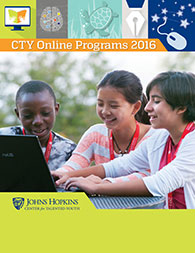Honors Pre-Algebra
Honors Pre-Algebra is a CTY Online course for students with qualifying scores on the SCAT and completion of grade 5 math. The course usually takes 6 months and its course code is PAL.
Contents
Course Description
From the CTY Online catalog:
This course covers a full-year honors curriculum and prepares students for success in Honors Algebra I, Cryptography, and other CTY Online Programs courses. The course begins with a review of grade 6 concepts. Students can proceed quickly through familiar material and take additional time on more difficult concepts. Students are also invited to participate and ask questions in an open Help Room guided by instructors.
The course has video lessons (provided by Thinkwell), sample exercises, practice exercises, online tests, two offline paper-based exams, an instructor, and access to a virtual classroom to meet with the instructor. Each student will be assigned an experienced math instructor who will:
Provide one-on-one support. Solve student’s doubts via e-mail or by appointment on the instructor’s virtual classroom. Keep constant communication with the student, at least once per week. Provide feedback on the student’s performance in the course. Students will also have access to a pause service that can be used to pause the course for 7 days or longer. This service can only be requested by a parent/guardian and is very useful to use during busy school weeks, vacation, or other events that will not allow the student to access and advance in the course.
List of Topics
Whole Numbers
- Reading and Writing Whole Numbers
- Rounding Whole Numbers
- Adding Whole Numbers
- Subtracting Whole Numbers
- Multiplying Whole Numbers
- Dividing Whole Numbers
- Properties of Whole Numbers
Integers
- Integers and the Number Line
- Adding and Subtracting Integers
- Multiplying and Dividing Integers
- Introduction to Exponents
- The Order of Operations
Fractions
- Factors and Prime Factorization
- Multiples and Equivalent Fractions
- Greatest Common Factor
- Least Common Multiple
- Multiplying Fractions and Mixed Numbers
- Dividing Fractions and Mixed Numbers
- Adding and Subtracting Fractions and Mixed Numbers
Decimals
- Representing, Comparing, and Ordering Decimals
- Rounding and Estimating Decimals
- Adding and Subtracting Decimals
- Multiplying Decimals
- Dividing Decimals
- Converting between Fractions and Decimals
Variables, Expressions, and Equations
- Variables and Expressions
- Translating Words into Algebraic Expressions
- Simplifying Algebraic Expressions
- Translating between Tables and Equations
- Equations and Their Solutions
- Solving Addition Equations
- Solving Subtraction Equations
- Solving Multiplication Equations
- Solving Division Equations
Solving Equations and Inequalities
- Solving Equations Containing Integers
- Writing and Solving Two-Step Equations
- Writing and Solving Multi-Step Equations
- Solving Equations with Variables on Both Sides
- Inequalities
- Solving Inequalities by Adding or Subtracting
- Solving Inequalities by Multiplying or Dividing
- Solving Two-Step Inequalities
Ratios, Proportions, and Percents
- Ratios and Rates
- Proportions
- Finding an Unknown Value in a Proportion
- Applications of Proportions
- Introduction to Percents
- Percents
- Relating Percents, Decimals, and Fractions
- Solving Percent Problems
- Simple Interest
Measurement, Statistics, and Graphs
- Understanding Customary Units of Measurement
- Understanding Metric Units of Measurement
- Converting Customary Units
- Converting Metric Units
- Time and Temperature
- Organizing Data: Stem and Leaf and Line Plots
- Bar Graphs and Histograms
- Line Graphs
- Reading and Interpreting Circle Graphs
- Measures of Central Tendency: Mean, Median, Mode, and Range
- Box-and-Whisker Plots
- The Coordinate Plane
- Tables and Graphs
- Graphing Linear Equations
- Graphing Using Intercepts
- An Introduction to Slope
- Finding the Slope Given Two Points
Geometry
- Triangles
- Quadrilaterals
- Finding Angles in Polygons
- Similar Figures
- Congruent Figures
- Perimeter
- Area of Rectangles and Parallelograms
- Area of Triangles and Trapezoids
- Circles and Circumference
- Area of Circles
- Area of Composite Figures
- Comparing Perimeter and Area
- Square Roots and the Pythagorean Theorem
- An Introduction to Three-Dimensional Figures
- Volume of Prisms and Cylinders
- Volume of Pyramids and Cones
- Surface Area of Prisms and Cylinders
- Surface Area of Pyramids and Cones
- Volume and Surface Area of Spheres
Exponents and Polynomials
- Product and Power Properties of Exponents
- Integer Exponents
- Quotient Properties of Exponents
- Scientific Notation
- An Introduction to Polynomials
- Simplifying Polynomials
- Adding and Subtracting Polynomials
- Multiplying and Dividing Monomials
- Multiplying Monomials by Polynomials
Probability
- An Introduction to Probability
- Experimental Probability
- Counting Methods and Samples Spaces
- Theoretical Probability
- Compound Events
- Making Predictions
- Probability of Independent and Dependent Events
- Permutations and Combinations
